93% of home buyers start their search online. This makes Real estate website design prominent in the digital realm. Doesn’t matter if you are a real estate agent broker, having an impressive online presence is crucial to thrive in the competitive market.
According to the National Association of Realtors that 47% of buyers look for online properties for sale before buying a home. This proves that in the digital age, you need to be where the action is.
However, user experience plays a crucial role in retaining visitors to a website. In fact, 38% of users will stop engaging with a website if they find the layout unattractive.
This is why to widen the business opportunities businesses have to actively use technology. Especially in the high competitive industries like Real estate. With this real estate market is expected to generate revenue of $4,263.7 bn by 2025 according to Grand View Research.
Design is not just what it looks like and feels like. Design is how it works, and in the realm of real estate, a well-developed website is the key to unlocking success.” – Steve Jobs (Co-founder of Apple Inc.)
By going through the above stats, shows that real estate app development is in demand and you should go for it. If you are investing in this landscape. With this let’s start with the article.
Understanding The Importance Of Real Estate Website Design And Development
Real estate and buyers always publish listings on the front page of the newspaper with technology shifting, now creating an online presence become crucial in this competitive environment. Doesn’t matter what service you provide website development is a crucial step for the success of the real estate business.
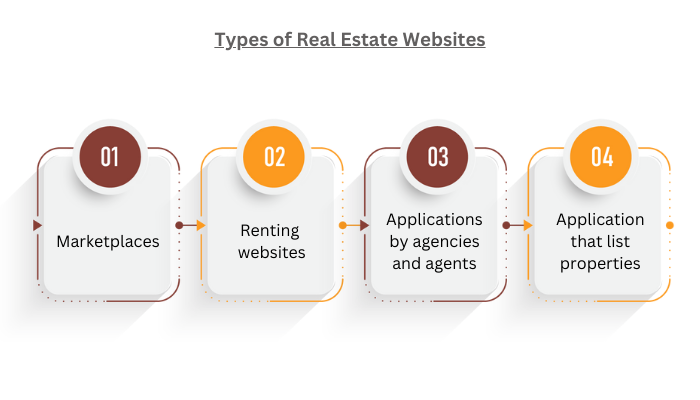
Types of Real Estate Websites
Types of Real estate websites | |
Marketplaces | This is the place where the seller and buyer come together and have mutual transaction benefits. Here customer search for real estate options, review them, and communicate with the sellers. For example Zillow and Airbnb.
|
Renting websites | When it comes to renting websites they are more focused on landlords and tenants of the rentals. Some popular examples are Trulia, Rentals.com, and Lovely
|
Applications by agencies and agents | There are applications specifically developed by real estate agencies and agents to showcase their own property listing and provide additional services to their clients. Examples are Realtor.com, Redfin and many more.
|
Application that lists properties | With this applications aggregate property listing from multiple sources, including real estate websites, and provide users with a centralized platform to search and browse through available properties.
|
Why Investing In Building A Real Estate Website Is Profitable Venture?
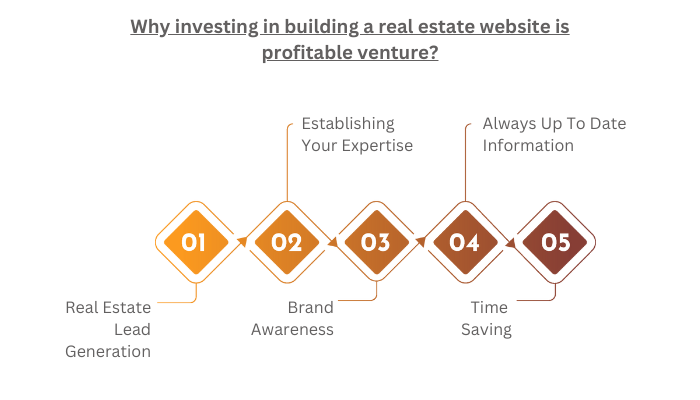
Building A Real Estate Website Is Profitable Venture
Designing a real estate website has several benefits unlike physical offices with limited operating hours, a real estate website is accessible 27/7. Prospective buyers & renters can explore the listing and learn about business services at any time.
Let’s discuss some key benefits of having a real estate website.
Real estate lead generation
For every business lead generation is what helps business to grow. When it comes to luxury real estate website design, the first aim is to build a website that drives traffic to generate enough leads.
To attract potential clients your website should be appealing and runs smoothly.
Establishing your expertise
Now first thing first, if you want to drive your real estate business crazy, your reputation management is to be good. The website should speak the work and there is always unsatisfied client. If you want to build trust among the customers your website should be optimized from time to time.
Brand awareness
It is a crucial process of establishing a strong presence as a real estate agent. To improve brand awareness to your target client through your website, you have to establish a strong brand presence in the market.
Regularly maintaining the website will do that, all you have to do is continues to engage in marketing efforts and adapt your strategies based on the feedback of the customers.
Remember it’s not a one-time process; the efforts should be ongoing.
Always up-to-date information
Once your website is ready give the exact information about the property to be sold in that area, and what is currently available in the market. If your real estate website is designed in such a way that it gives excellent information that users want, it is bound to generate a lot of traffic.
Time-saving
The main job of the realtors is to close deals that lead to all the paperwork. When you have a feature-rich website you can easily streamline your business operations and focus on your core responsibilities.
Moreover, the website will not only generate leads but also allow you to dedicate more time to guide clients through staging and preparing their homes for sale.
With this, you can also maintain post-sale communication effortlessly through email and other online channels ensuring excellent client satisfaction.
Basic Requirements While Developing A Real Estate Website
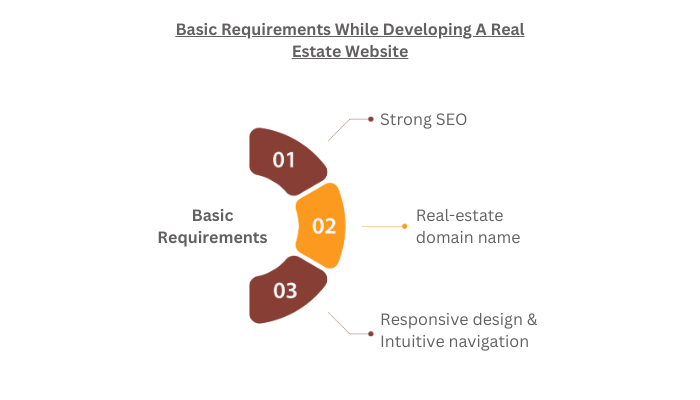
Basic Requirements While Developing A Real Estate Website
Now, if you are ready to develop a real estate website some basic requirements will make your website user-friendly. Plus, it will significantly increase your client retention rate and generate leads.
Here are three main pillars of a real estate website when it comes to design and hosting.
Strong SEO
Once your website goes live, implementing effective search engine optimization techniques (SEO) is crucial to ensure your website ranks high in search engine results.
This includes keyword research, optimized meta tags, quality content, and proper URL structure among other strategies to improve visibility and attract organic traffic.
Real-estate domain name
Choosing a relevant and memorable domain name that reflects your real estate business is essential. It should be easy to spell, concise, and directly related to the real estate industry. This helps establish your brand identity and improves user recognition and trust. Some of the top real estate website designs has catchy domain names.
Responsive design & Intuitive navigation
A responsive website design ensures that your site adapts and displays properly on various devices, including desktops, smartphones, and tablets.
Additionally, an intuitive navigation system enables users to easily explore property listings, filter searches and access important information. This will encourage visitors to stay longer and engage with your website.
Key Features Of A Real Estate Website
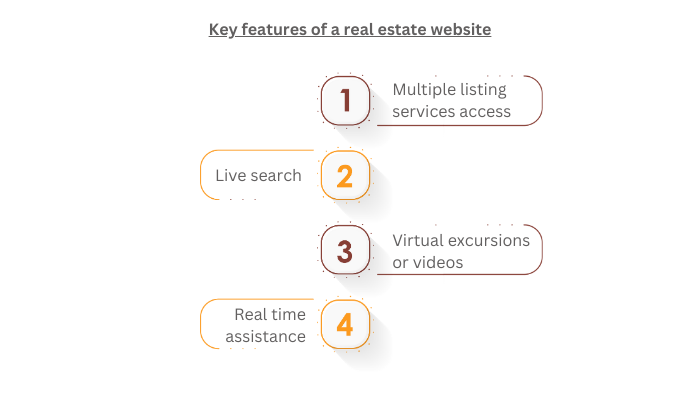
Key Features Of A Real Estate Website
Before you start real estate web development, there is a list of must-have features that you need to include in your real estate website. With this let’s take a look at the features.
Multiple listing services access
A custom real estate website design should have an MLS feature to connect users to MLS data. With MLS, it creates interaction between sellers and buyers making the website more visible to various agents.
Also, it will connect the website directly to the local MLS database.
Live search
Real estate websites should contain search filters that provide users with relevant results. With your website, you can provide users with search filters for the listing types, prices, amenities, facilities, etc.
Moreover, if it helps in finding exactly what users want it will increase the traffic on your website.
Virtual excursions or videos
When your website provides a detailed and informative guide about the interior and exterior modeling of real estate, it’s better for users.
However, if you provide a video excursion with virtual reality will make your website a perfect guide to real estate properties. It will help rentals and buyers with a clear visualization of the property.
Real-time assistance
This is the most crucial feature that channelizes the communication between the buyer and the seller. If you integrate an AI bot for chat assistance it will help in placing the requirements before each other.
It can be in the form of voice, live chat, and video messaging. In addition, it can be a great tool to connect with realtors and get feedback from clients.
Additional Features Of Real-Estate Website
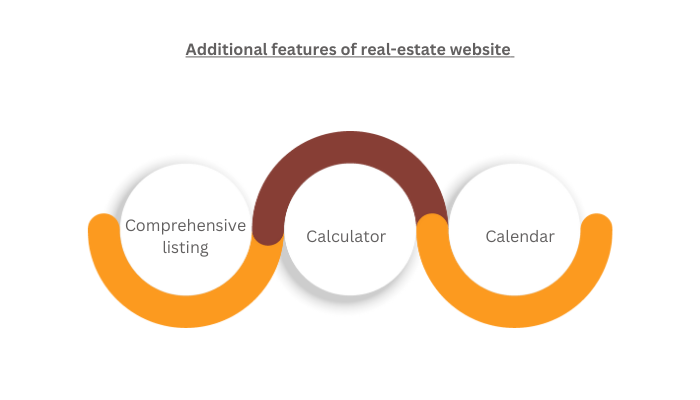
Additional Features Of Real-Estate Website
Basic features are part of the website but when you add advanced features it will enhance the website and improve user experience.
Comprehensive listing
It’s obvious that potential buyers and tenants will get to know the full information about the property. Just make sure to provide a detailed listing of your website involving prices, descriptions, crime rates, and demographics.
Calculator
With this feature it will help you for calculating house affordability by considering criteria like annual household income, interest rates, and many other things.
Calendar
When you integrate this feature into your real estate website, this lets users book meetings and look over the property. With this feature, user can easily customize their meeting at their own pace.
A Step-By-Step Guide To Building A Real Estate Website
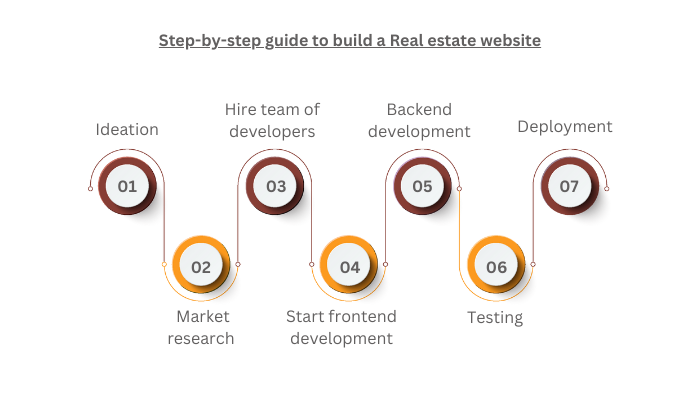
Step-by-step guide to build a Real estate website
When you create a real estate website, it is essential to consult the cost of a real estate website so that you can save your time and money. Here are the steps to build a real estate website.
Ideation
This is the first step before you start the Real estate website development. All you have to do is ensure all the necessary features and brainstorm what you need to include in your website.
Then try and formulate the purpose of website development, and start with the process.
Market research
This is the most crucial step; conducting extensive market research will help you in finding competitors and what your users are expecting from your app.
With this, you can rectify the mistakes of your competitors in your real estate app.
Hire a team of developers
After conducting market research, it’s time to hire experienced real estate developers. Additionally, you can hire a team of coders, real estate website designer, and QA. Just make sure to check their previous working experience to ensure their expertise.
Start frontend development
Now it’s time to start the frontend development ask your team of UI/UX designers to create a lucrative frontend of the app. Therefore, if the front end is appealing it will help in increasing client retention rate.
Backend development
After the completion of the frontend ask the team of experienced developers to start developing the backend. Ask them to write clean code so that there will be fewer bugs and errors. If there are fewer errors and bugs your real estate app success is ensured.
Testing
When the development process is completed, the team of QA will conduct testing in order to fix bugs and issues with your website. If they find any, they will rectify and improve the optimization of your website which significantly improve the performance of the website.
Deployment
After testing is successfully completed, it’s time to deploy your website on the web.
How Much Does It Cost To Build A Real Estate Website?
When it comes to real estate website design cost depends on several factors. For a basic real estate website with standard features and templates, you can expect to spend anywhere between $1000 and $5000.
This is for simple design, for advanced features and customization such as CRM tools, interactive maps, and responsive design the cost can range from $5,000 to $20,000 or more.
However, these cost estimates are general and can vary significantly depending on factors like the complexity of the website, level of customization, and developer’s rate.
If you want a more accurate cost it’s advisable to consult with us we have a team of web development professionals who will provide you with a detailed quote.
Conclusion
As we have discussed above, real estate websites are in trend. It’s crucial to carefully consider your specific needs and budget before investing in real estate website development. Don’t forgot to consult with the real estate website design company.
By understanding your needs, consulting with professionals, and allocating an appropriate budget, you can create a functional and visually appealing real estate website that aligns with your goals and attracts potential clients or customers in the competitive real estate market.
FAQs
The first step is planning and defining your website’s goals, target audience, and desired features. This helps create a clear vision for the project.
The timeline varies based on complexity, customization, and developer availability. A basic website may take a few weeks, while a more advanced one can take several months.
Yes, with a content management system (CMS), you can easily manage and update property listings, descriptions, images, and other relevant content on your real estate website.
Yes, integration with a real estate CRM system allows for better customer management, lead tracking, and streamlined communication between your website and CRM software.
Implementing SEO practices like keyword optimization, meta tags, user-friendly URLs, and optimizing page load speed can help improve your website’s visibility in search engine results.
Yes, virtual property tours can be integrated into your website using technologies like 360-degree photography, virtual reality (VR), or video walkthroughs to enhance user experience.
Implementing SSL certificates, secure user authentication, regular backups, and using reputable hosting services can enhance the security of your website and protect user data.
Website maintenance costs depend on the level of support required. It can range from a monthly fee for routine updates to an hourly rate for occasional maintenance tasks.

Niketan Sharma is the CTO of Nimble AppGenie, a prominent website and mobile app development company in the USA that is delivering excellence with a commitment to boosting business growth & maximizing customer satisfaction. He is a highly motivated individual who helps SMEs and startups grow in this dynamic market with the latest technology and innovation.
Table of Contents












No Comments
Comments are closed.